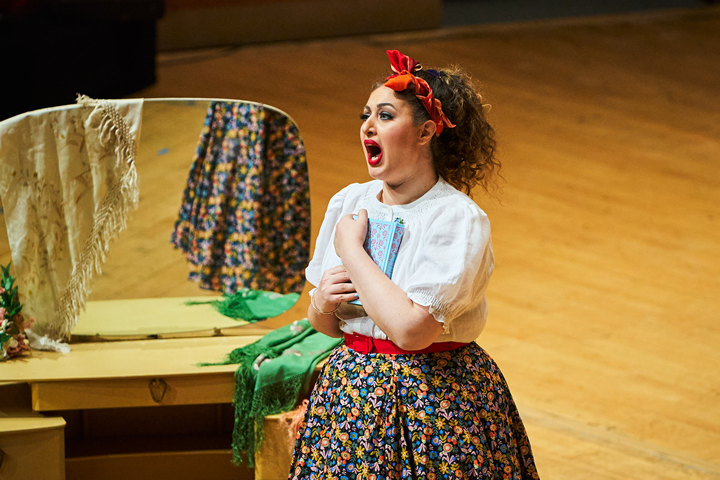| Opera Reviews | 29 April 2024 |
An entertaining evening of Rachmaninov and Stravinskyby Catriona Graham |
|
Rachmaninov: The Miserly Knight |
|
 |
|
|
Scottish Opera regularly programmes concert and semi-staged performances of lesser-known operas. The latest is a double bill of one-act operas based on works by Pushkin, which makes an interesting pairing. Presented in semi-staged performances directed by Laura Attridge, with a full orchestra conducted by Stuart Stratford, it brings out the similarities in the stories, the differences in treatment and musical styles, First comes The Miserly Knight, by Rachmaninov, in which a teenage son, Albert, having squandered his money on tournaments, complains to the Duke about his father the Baron.. The five characters are in black, each with an accessory; the servant has an apron, the son a scarf, the moneylender a hat and briefcase, the Duke a sash, and the Baron a gold chain like a mayor’s. Scenes are indicated by white cards held up with the details, like a silent movie. Alexey Dolgov is a good Albert, whinging to his servant (John Molloy) about his poverty, when his father is well able to give him the money he needs. Alasdair Elliott, as the moneylender, has a clear lyrical tenor, and is far from obsequious in the unsuccessful attempt of Albert to borrow more money. The Duke is sung by Alexey Gusev, a no-nonsense governor seeking to keep good order in his lands. The Baron, sung by Roland Wood, is a tour de force. Stepping in at short notice, Wood is singing score in hand, but then the whole of the second scene is him alone, with his wealth – a single aria, lasting an awful long time. He sings through whence each amount was obtained. In the semi-staging, each of the other singers holds a small black treasure chest, the Baron opens each in turn, gloating over its contents. In the final scene, the Duke’s attempt to take the Baron to task, and the suggestion of sending the son to live at court, with an allowance, causes the Baron to collapse with shock, clutching the keys to his cellar of wealth. The second opera, Mavra, by Stravinsky, tells of a young girl who introduces her boyfriend in disguise as a replacement for her mother’s dead maid. Staged in a sunny Fifties, the set consists of a dressing-table and stool. Anush Hovhannisyan is a vivacious Parasha, with a decidedly OTT love-lorn song to set the scene. Dolgov reappears as the boyfriend; his acting as the maid, in cross-over pinny, hair tied up in a scarf, bucket and broom, is a hoot. His mime of smooching Parasha later that night, using the broom-handle is excellent. As the mother Sarah Pring is a wonderfully bustling person, and the duet with her neighbour (Lea Shaw) is a masterpiece in talking a lot without saying anything much. When returning to check on the new maid, she finds him having a quick shave. She is overcome with shock and face-plants on the stage. It all makes for an entertaining and enjoyable performance, while the orchestral playing brings out the richness and variety of texture and sound. |
|
Photo © Fraser Band |
|







